Cannabidiol (CBD) is one of the most common compounds found in the Cannabis sativa plant, sometimes referred to as a cannabis plant or hemp plant. CBD shows promise for benefiting health in several ways, such as easing symptoms associated with anxiety, arthritis, and insomnia. (1)
CBD is available in several forms, including but not limited to capsules, gummies, and oil. CBD oil is made by extracting CBD from the cannabis plant and then mixing it with a carrier oil like coconut, hemp seed, or MCT oil. (1) This creates an easy-to-take CBD product that can be used as a natural remedy for common ailments ranging from stress to sleep troubles.
While CBD has been shown to be effective and relatively safe when used appropriately, finding a high-quality CBD oil that suits your health needs, budget, and dietary preferences can be challenging. To help you navigate the crowded CBD oil market and to make your shopping process easier, we evaluated dozens of CBD oil products based on ingredients, quality, dosage, safety, and effectiveness to narrow down the top four in 2024.
Editor’s choice: Canna River CBD Ultra Pain Tincture
Packing 125 milligrams of broad- or full-spectrum CBD per milliliter Canna River CBD Ultra Pain Tincture earns our pick for editor’s choice. Not only is this product affordable and third-party tested, but it comes in multiple flavors, and the dose can be adjusted based on your health needs.
Medical disclaimer: This article is intended for educational and informational purposes only. It is not intended as a substitute for medical advice. For health advice, contact a licensed healthcare provider.
Our picks for the best CBD oil
- Best for pain: Canna River CBD Ultra Pain Tincture
- Best isolate: Extract Labs Organic CBD Isolate Oil
- Best for anxiety: Charlotte’s Web Daily Edge Broad Spectrum CBD Tincture
- Best for sleep:Redeem Therapeutics CBD Tincture for Sleep
Compare CBD oil
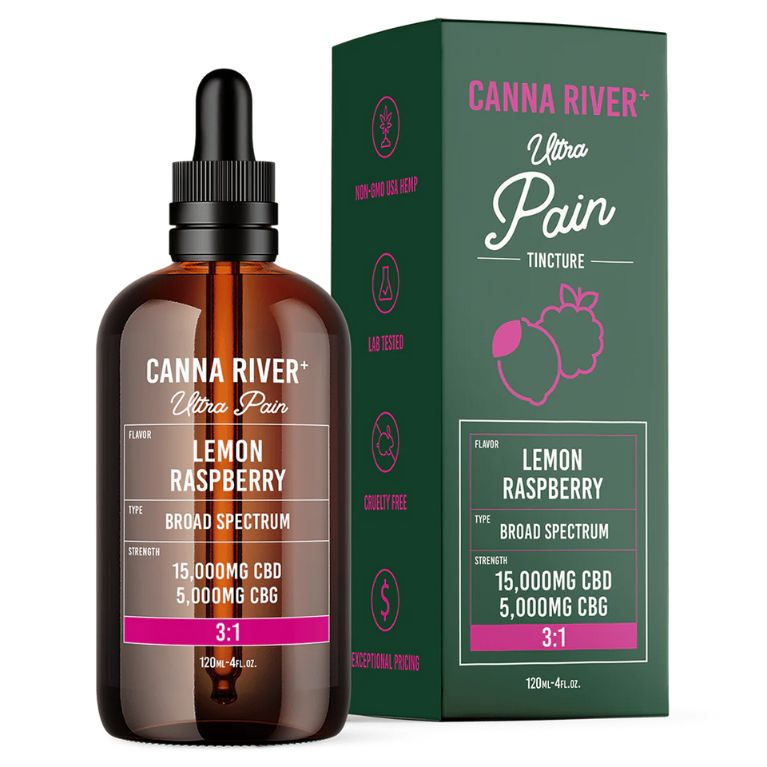
|
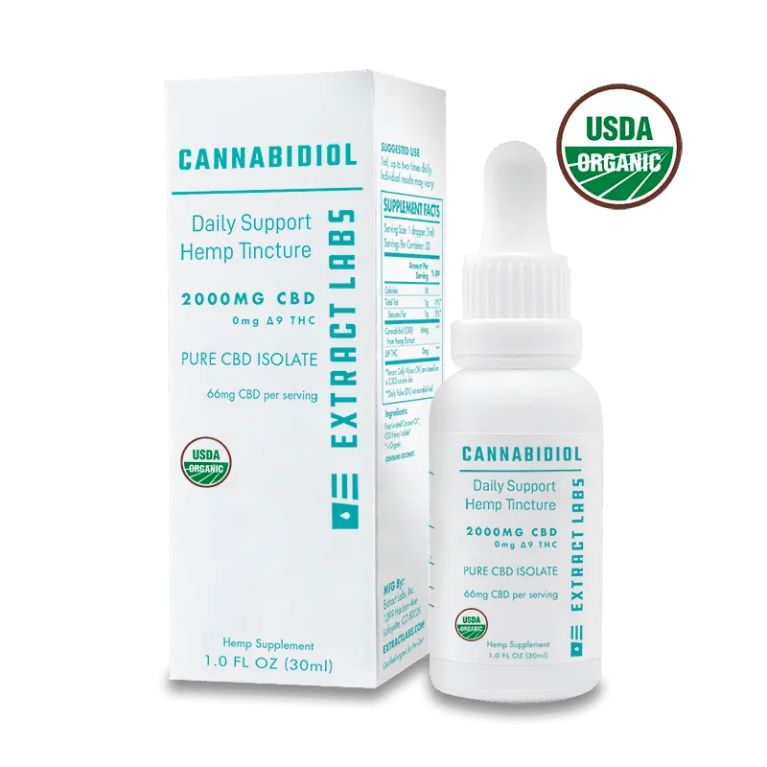
|
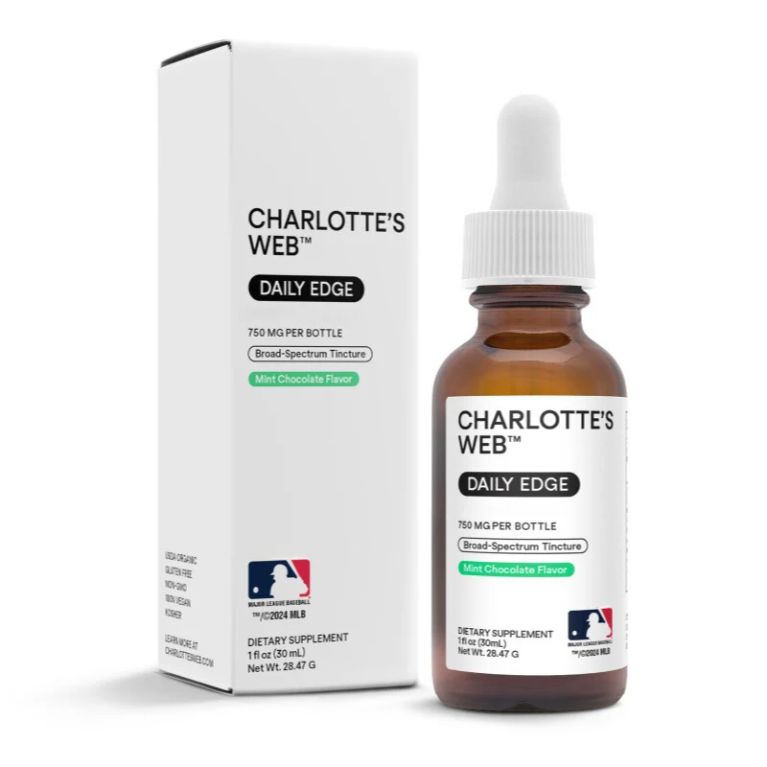
|
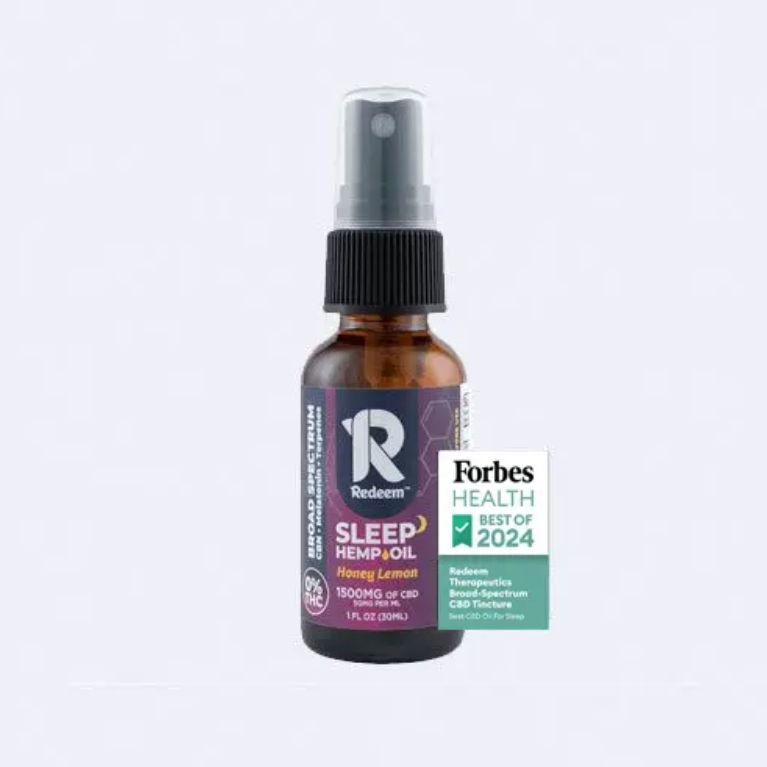
|
|
| Canna River CBD Ultra Pain Tincture | Extract Labs Organic CBD Isolate Oil | Charlotte’s Web Daily Edge CBD Tincture | Redeem Therapeutics CBD Tincture for Sleep | |
| Rating | ||||
| Cost per serving | $0.83 | $2.33-4.33 | $1.50 | $0.83 |
| Dosage | 1 milliliter (ml) | 1 ml | 1 ml | 0.5 ml |
| CBD content per dose | 125 milligrams (mg) | 66-200 mg | 25 mg of total cannabinoids | 25 mg |
| CBD type | Broad- or full-spectrum | Isolate | Broad-spectrum | Broad-spectrum |
Best CBD oil for pain: Canna River CBD Ultra Pain Tincture
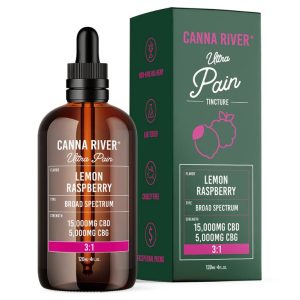

Key product features
What you should know
Canna River CBD Ultra Pain Tincture is made with CBD and cannabigerol (CBG), another cannabinoid with research-backed anti-inflammatory properties. (1, 2, 3)
- Canna River CBD Ultra Pain Tincture is third-party tested and designed for playing a role in pain relief, making it a potential solution for many different populations.
- At $0.83 per serving, Canna River’s CBD is less expensive than many other products on the market.
- Canna River CBD Ultra Pain Tincture is designed to relieve pain and may be an effective way to manage joint and muscle pain related to exercise. (2)
Why we like Canna River CBD Ultra Pain Tincture as best for pain
Designed for pain management, Canna River CBD Ultra Pain Tincture may be beneficial for those experiencing pain associated with conditions such as arthritis, as well as short-term muscle soreness following physical activity. (2, 3)
CBD and other cannabinoids like CBG, interact with receptors in the endocannabinoid system (ECS), a signaling network that regulates several processes within your body, including but not limited to pain sensation and inflammation. (4) For example, these cannabinoids interact with CB1 and CB2 receptors, which are found throughout the body and work to ease pain and inflammation, respectively. (1)
Canna River CBD Ultra Pain Tincture is available in full- or broad-spectrum CBD. Full-spectrum CBD products contain all components of the cannabis plant, including CBD and other beneficial compounds like flavonoids, cannabinoids, terpenes, and essential oils. It’s important to note that full-spectrum CBD products contain very low levels of tetrahydrocannabinol (THC), the psychoactive component of cannabis. Full-spectrum CBD products must contain less than 0.3% THC on a dry weight basis to be legally sold as a hemp product. (1)
If you’d like to avoid THC, you could choose the broad-spectrum option. Broad-spectrum CBD also contains all extracts of the cannabis plant but is nearly THC-free and only contains trace amounts. The Canna River website states that their Broad-Spectrum CBD Ultra Pain Tincture is THC-free. (1)
In addition to containing 125 mg of CBD, a 1-ml serving of this product also delivers 42 mg of CBG. Both CBD and CBG have been shown to be effective for reducing pain. For example, a 2023 study found that combined treatment with 35 mg of CBD and 50 mg of CBG (plus magnesium and amino acids) helped reduce muscle soreness and stiffness related to exercise. (2)
“It should be noted that this dosage is unusually high,” Dr. Swathi Varanasi, PharmD notes. “With cannabinoids, more is not always better.”
CBD supplementation may reduce muscle damage caused by intense exercise and promote muscle recovery after a 72-hour interval, possibly making CBD a worthwhile natural treatment for athletes. (5)
CBD and other cannabinoids like CBG may be effective for reducing other types of pain as well, including joint pain caused by medical conditions like arthritis. (3)
A 2022 study that included data on 428 people with arthritis found that CBD use was associated with significant improvements in physical function and joint pain. The participants who used CBD reported a significant 44% reduction in pain. CBD was especially effective in those with osteoarthritis and seemed to be less helpful for people with autoimmune arthritis, including rheumatoid arthritis. (3)
In the same study, 31.1% of the participants reduced their intake of anti-inflammatory medications and 17.8% stopped taking them completely. Pain medications like opioids and acetaminophen can have unwanted side effects, such as stomach ulcers and heart-related complications, so finding a natural pain relief alternative, like CBD, may help reduce the risk of these side effects. (3)
Doses of CBD and other cannabinoids like CBG used to treat pain vary, so it’s best to speak with a healthcare provider with a specialization in herbal medicine and/or cannabis medicine to find the right dose for your health needs. Fortunately, the dose of Canna River CBD Ultra Pain Tincture can be adjusted based on your preferences.
This oil product is easy to take and comes in three flavors; Sweet Mint, Mango Peach, and Lemon Raspberry. There is also a “natural” flavor, which appears to be Canna Rivers’ version of an unflavored option.
Additionally, this product is sweetened with sucralose, an artificial sweetener that’s 600 times sweeter than sucrose, or table sugar. Although sucralose is FDA-approved for use in food and supplements, its use has been linked with several health concerns at high doses, such as a potential association with an increased risk of heart disease. (6) If you’d like to stay away from artificial sweeteners, this product isn’t the right choice for you.
Canna River CBD Ultra Pain Tincture is made with CBD from American-grown hemp plants and is gluten-free, non-GMO, and third-party lab tested for quality and purity. A certificate of analysis (COA) is also available on the Canna River website. COAs are documents that verify a supplement has undergone testing and meets specific quality standards, such as being free from contaminants like heavy metals.
Both the broad- and full-spectrum versions are fairly priced at $0.83 per serving, which makes this supplement a good option for people on a budget. To save a little extra money, customers can sign up for a subscription on the Canna River website for 20% off their purchase.
Specs
| Serving size | 1 ml |
| Servings per container | 120 |
| Price per serving | $0.83 |
| Type of CBD | Broad-spectrum or full-spectrum |
Best CBD isolate oil: Extract Labs Organic CBD Isolate Oil
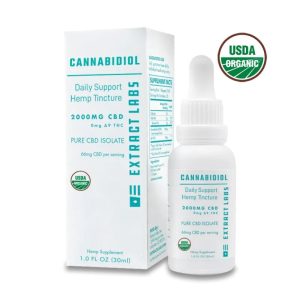

Key product features
What you should know
Extract Labs Organic CBD Isolate Oil is third-party tested, certified organic, and THC-free, making it an excellent option for supporting overall wellness.
- Extract Labs Organic CBD Isolate Oil comes in two different strengths, so you can choose the one that best suits your needs and preferences.
- Costing $2.33–$4.33 per serving, this product fairly expensive compared to other options on the market.
- Naturally free from THC, isolate products are safe for those who want a THC-free product that delivers an effective dose of CBD. (1)
Why we like Extract Labs Organic CBD Isolate Oil as best isolate
If you’re looking to try CBD and prefer a CBD-only option, CBD isolate products are the way to go. CBD isolate products, like Extract Labs Organic CBD Isolate oil, only contain CBD and are free from other components of the cannabis plant, including THC, which is the psychoactive (or intoxicating) component of the cannabis plant responsible for the “high” associated with smoking or ingesting cannabis. (1)
Even though other CBD products, like full-spectrum CBD, contain trace amounts of THC, some people may not be comfortable with ingesting any THC due to medical issues or personal preferences. Extract Labs Organic CBD Isolate oil is 100% THC-free, making it a good choice for people who want the benefits of CBD but don’t want to ingest THC.
In addition to being free from THC, this product is certified organic and contains fractionated coconut oil, which may help to absorb CBD as it’s a fat-soluble compound. (7)
This product is available in two strengths: 66 mg or 200 mg per 1 ml serving. With either choice, you can rest assured that this THC-free product won’t impair your judgment or performance. In fact, a 2024 review that included 20 studies found that oral CBD isolate administration in doses ranging from 15 to 4,500 mg had no effect on cognitive or psychomotor performance compared to placebo treatments. (8)
Extract Labs CBD Isolate Oil is made with American-grown hemp and is certified vegan and kosher. However, it’s unclear if this product is safe for people with food allergies and those with medical conditions like celiac disease.
Costing $2.33-4.33 per serving, this product is the most expensive in our roundup and may be too pricey for many people’s budgets. However, people who require lower doses of CBD per day can save money by taking half of the recommended 1 ml dose, which still provides an evidence-based dose ranging from 33-100 mg.
While Extract Labs CBD Isolate Oil is advertised as 100% THC-free, people who have to take drug tests should be aware that the company does not guarantee it’s safe for drug testing.
Specs
| Serving size | 1 ml |
| Servings per container | 30 |
| Price per serving | $2.33-4.33 |
| Type of CBD | CBD isolate |
Best CBD oil for anxiety: Charlotte’s Web Daily Edge Broad Spectrum CBD Tincture
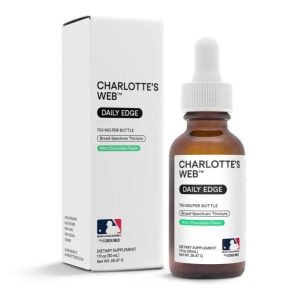

Key product features
What you should know
Made with broad-spectrum CBD, Charlotte’s Web Daily Edge Broad Spectrum CBD Tincture is a good option for those looking for a natural remedy for feelings associated with anxiety. (9)
- We like that Charlotte’s Web Daily Edge Broad Spectrum CBD Tincture is third-party tested, certified organic, and free from artificial sweeteners, colors, and other additives.
- This product costs $1.50 per serving, which is priced similarly to other broad-spectrum CBD products on the market.
- Broad-spectrum CBD products like Charlotte’s Web Daily Edge Broad Spectrum CBD Tincture contain additional components of the cannabis plant which may work together in the body to reduce symptoms related to anxiety. (1, 9)
Why we like Charlotte’s Web Daily Edge Broad Spectrum CBD Tincture as best for anxiety
Broad-spectrum CBD products, like Charlotte’s Web Daily Edge Broad Spectrum CBD Tincture, may be a better choice than isolated products for people experiencing feelings of anxiety. Broad- and full-spectrum CBD contains beneficial substances like other cannabinoids such as CBG and cannabinol (CBN) and organic compounds called terpenes. Full-spectrum CBD products must contain less than 0.3% THC by dry weight, which is the federal legal limit for CBD products. (1) Broad-spectrum contains all of the same components as full-spectrum CBD but contains no, or only trace amounts of, THC. (1)
Unlike CBD isolates, which only contain CBD, the multiple components in broad-spectrum CBD work together in the body. The term “entourage effect” is used to describe the combined effects of these plant substances in the body. (1)
Due to this “entourage effect” broad- and full-spectrum CBD products may be more effective for treating certain mental health conditions, like anxiety. (1)
Though research on the effects of CBD on anxiety symptoms is limited at this time, some study findings suggest that people who supplement with CBD products, including broad-spectrum CBD, may experience reductions in anxiety-like symptoms and improvements in their overall quality of life. A 2018 study that surveyed 2,409 people found that 36% of the respondents reported that CBD was effective for treating medical conditons like anxiety and that it worked well as a standalone treatment. Though this study didn’t differentiate the results based on the form of CBD used, some of the participants were using broad- or full-spectrum products. (9)
Charlotte’s Web Daily Edge Broad Spectrum CBD Tincture contains 25 mg of total cannabinoids per 1 ml serving, including CBD derived from certified organic hemp. Not only is this product certified organic, but it’s NSF Certified for Sport®. NSF Certified for Sport® is a certification program which verifies that products are free from the 280 substances banned by major athletic organizations such as anabolic agents and stimulants.
Another major plus of Charlotte’s Web Daily Edge Broad Spectrum CBD Tincture is that it comes in a delicious chocolate mint flavor. Since this product isn’t available in an unflavored version it’s not the best choice for people who prefer unflavored products.
This product is third-party tested and full lab results are available on the company’s website. Charlotte’s Web Daily Edge Broad Spectrum CBD Tincture is certified organic and is free from major allergens like gluten and artificial sweeteners, colors, and other additives.
This product costs $1.50 per serving, which is more expensive than the other broad-spectrum CBD product on our list, but priced similarly to other broad-spectrum CBD products on the market. To save more money, customers can sign up for a subscription on the Charlotte’s Web website for 30% off their purchase.
Specs
| Serving size | 1 ml |
| Servings per container | 30 |
| Price per serving | $1.50 |
| Type of CBD | Broad-spectrum CBD |
Best CBD oil for sleep: Redeem Therapeutics CBD Tincture for Sleep
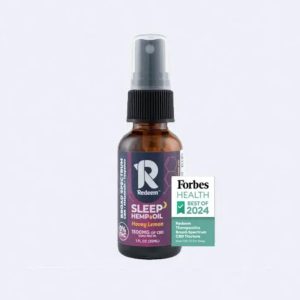

Key product features
What you should know
Redeem Therapeutics CBD Tincture for Sleep contains 25 mg of broad-spectrum and 3 mg of melatonin, which may promote restful sleep. (10, 11)
- Redeem Therapeutics CBD Tincture for Sleep is third-party tested for quality and purity, vegan-friendly, and THC-free.
- At $0.83 per serving, this product is an affordable choice for a natural sleep aid.
- Taking a CBD and melatonin supplement, like Redeem Therapeutics CBD Tincture for Sleep, may improve sleep disturbances related to conditions like insomnia and help you get a better night’s sleep. (10, 11)
Why we like Redeem Therapeutics CBD Tincture for Sleep as best for sleep
Convenient, sugar-free, and packed with sleep-enhancing ingredients, Redeem Therapeutics CBD Tincture for Sleep is our pick for the best CBD oil for sleep. It’s available as a spray or dropper, and each 0.5 ml serving provides 25 mg of broad-spectrum CBD, 10 mg of CBN, and 3 mg of melatonin, all of which may have sleep-enhancing effects.
Broad-spectrum CBD is similar to full-spectrum CBD in that it contains more beneficial components of the cannabis plant than isolate products. However, broad-spectrum CBD is nearly free of THC. Redeem claims that their CBD Tincture for Sleep is free from THC and is even safe for people who need to take drug tests. (1) This makes this product a safe option for people who need to avoid THC.
In addition to playing a role in pain and anxiety relief, CBD has also been shown to improve sleep quality by stimulating receptors in the ECS that regulate sleep-wake cycles, making it easier to fall and stay asleep. Doses of CBD shown to be effective for improving sleep vary, but a 2023 study found that 50 mg of CBD for eight weeks led to significant improvements in sleep quality in healthy, young adults. (12)
Redeem Therapeutics CBD Tincture also contains CBN, which has been shown to improve overall sleep quality and reduce nighttime awakenings when taken in doses of around 20 mg for seven consecutive nights. (13) Though a 0.5 ml dose of this product only contains 10 mg of CBN, you can increase your dose to reach this amount, depending on your needs and the guidance of a healthcare provider with expertise in cannabis medicine.
To further enhance sleep quality, a serving of Redeem Therapeutics CBD Tincture for Sleep contains 3 mg of melatonin, a dose shown to be effective for improving total sleep time, deep sleep, and early morning wake time in people with insomnia. (14) Melatonin is a natural compound produced by your body that regulates your sleep-wake cycle. It can also be taken as a magnesium supplement.
As this product can make you sleepy, it’s recommended to take Redeem Therapeutics CBD Tincture for Sleep 30-45 minutes before bed.
Redeem Therapeutics CBD Tincture for Sleep is made with US-grown organic hemp and is third-party tested for purity, quality, and contaminants, such as pesticides and heavy metals. It’s also gluten-free, vegan, and THC-free.
A downside to this product is that it only comes in one flavor—Honey Lemon—which is sweetened with stevia. Although this sweetener is sugar-free, the intense sweetness of stevia may be too strong for people with sensitive palettes and those who prefer unflavored products.
Redeem Therapeutics CBD Tincture for Sleep is affordably priced at $0.83 per serving. However, keep in mind that this price doubles if you decide to increase your dose to 1 ml, which some people may need to do to reap the product’s full effects. Customers can save 30% by signing up for a subscription on the Redeem Therapeutics website.
Specs
| Serving size | 0.5 ml |
| Servings per container | 60 |
| Price per serving | $0.83 |
| Type of CBD | Broad-spectrum CBD |
How we test supplements
With so many CBD oils on the market, narrowing down the best product for your health needs, budget, and dietary preferences can be challenging. To make shopping for CBD oil easier, our team of healthcare providers and industry experts analyzed dozens of CBD oils, using criteria like type of CBD, dose, additional ingredients, quality, effectiveness, third-party testing, and price to find the best CBD oils on the market. You can read our full supplement testing methodology here.
Here’s how we evaluated the CBD oils in this review.
Efficacy—40%
Our team analyzes each CBD oil considering the form of CBD used, the clinical evidence backing its potential health benefits, synergistic ingredients, and more. Here’s what we look at to find the most effective CBD oils:
- CBD form
- Clinical evidence
- Dose efficacy
- Synergistic effects
- Proprietary blends
Safety and side effects—35%
We ensure that all of the dietary supplements we recommend are generally considered safe for healthy people to take and are not associated with serious adverse side effects or long-term health concerns.
To recommend the safest CBD oils on the market, we evaluate:
- Reported side effects
- Third-party testing
- Manufacturer accreditation
- Medication interactions
- Dangerous or inappropriate label claims
- Potentially harmful ingredients
Value—20%
Everyone’s working with a different budget, which is why we aim to include CBD oils that are both effective and affordable.
The factors we look at for this area of testing include:
- Price per serving
Customer experience—5%
A customer’s experience with a company directly impacts satisfaction, loyalty, and the likelihood of repeat purchases. We include it in our testing process because the consumer experience guides purchasing decisions.
Our factors in this rating include:
- Ease of purchase
- Shipping and returns
- Customer support
What is CBD oil?
CBD is one of more than 80 cannabinoid compounds found in the Cannabis sativa, or hemp plant. Unlike THC, CBD doesn’t impair your judgment or coordination because it doesn’t have psychoactive or intoxicating properties due to the way it works and is broken down in the body. (15, 16)
CBD is available in many forms, including but not limited to gummies, capsules, and oils. CBD oils are made by extracting CBD from the cannabis plant and then putting it in a carrier oil like MCT oil, hemp oil, or fractionated coconut oil. (1)
There are three different kinds of CBD used in CBD oils: broad-spectrum, full-spectrum, and isolate. (1)
Full-spectrum CBD contains all extracts of the cannabis plant, including small amounts of THC. Full-spectrum CBD products must contain less than 0.3% THC by dry weight, which is the federal legal limit for CBD products. (1) Broad-spectrum contains all of the same components as full-spectrum CBD but contains no or only trace amounts of THC (0%). CBD isolate only contains CBD and is 100% THC-free. (1)
CBD is available in CBD-only products and is also commonly combined with other ingredients, such as herbs, sleep aids like melatonin, and other cannabinoids, such as THC and CBN.
CBD impacts health by interacting with the body’s endocannabinoid system or ECS, which regulates mood, sleep, and many other important processes. Though research is ongoing, some studies suggest that CBD may benefit certain health conditions, like anxiety, insomnia, and arthritis. (1)
How to tell if CBD oil is good quality
It can be difficult to assess CBD oil quality, but choosing CBD oil that’s been third-party tested for purity and quality can increase your chances of purchasing a high-quality and safe product.
All of the CBD oils in our roundup are third-party tested for contaminants such as heavy metals and pesticides. Third-party testing also ensures that products contain legal levels of THC. Additionally, a Certificate of Analysis (CoA) is necessary to ensure a high-quality product.
Unfortunately, many low-quality CBD products have been found to be inaccurately labeled and may contain more THC than what’s stated on the label and unsafe levels of contaminants like heavy metals. (17)
Many companies, including the companies listed in our roundup, post results from third-party laboratory testing on their websites. This makes it easy for customers to see exactly what their CBD supplements were tested for and that they’re safe to consume.
How to choose the right CBD oil for you
When shopping for CBD oil, there are a few factors to consider. First, it’s important to note that although CBD is generally considered safe, it’s not the right choice for everyone. For example, CBD may interact with commonly prescribed medications, such as certain pain medications and antidepressants, and can also impact certain laboratory tests, such as liver function tests. (18) CBD can also interact with commonly used over-the-counter and herbal remedies.
Additionally, CBD may cause side effects, such as mood changes, fatigue, appetite changes, and diarrhea. (1, 6) If you’re interested in taking CBD oil, it’s best to check with a healthcare provider with a speciality in herbal medicine or cannabis medicine first to ensure it’s the best choice for your specific needs, especially if you have a health condition or are taking one or more medications.
It’s also important to consider the dose and type of CBD. Some types of CBD may be more appropriate for certain health issues. It is patient-dependent, but full-spectrum and broad-spectrum products may be a better choice than CBD isolates for people with certain health conditions, like anxiety. Plus, broad- and full-spectrum CBD products may be less likely to cause side effects than CBD isolate. (9)
Though dosing for CBD varies widely and depends on your health goals and medical conditions, most healthcare providers recommend starting with a low dose of CBD and increasing your dose slowly over time. For example, a commonly recommended protocol is starting with 5 mg of CBD once or twice daily, then increasing it by 10 mg every two to three days until your desired dose is achieved. This can help reduce the risk of potential side effects and help your body gradually get used to the effects of CBD. (19)
Since CBD oils may contain additional ingredients, like herbs and other cannabinoids, you should always read ingredient labels so you can identify potentially problematic ingredients, such as common allergens, and know exactly what you’re ingesting.
Where to buy CBD oil
You can find CBD oil both online and in specialty stores like health food shops, supplement retailers, and dispensaries. While there are plenty of high-quality options out there, it’s crucial to choose a reputable company. Look for brands that follow strict safety standards and are transparent about their sourcing and manufacturing processes, as well as their third-party testing.
FAQs
What form of CBD is most effective?
When is the best time to take CBD oil?
Most CBD oil can be taken at any time of day. It is important to keep in mind that products designed to promote sleep should be taken before bed, and that the recommended dosage should not be exceeded.
These statements have not been evaluated by the Food and Drug Administration. These products are not intended to diagnose, treat, cure, or prevent any diseases.
Our experts
Swathi Varansi, PharmD
Dr. Swathi is a pharmacist with a passion about the intersection of personalized medicine and innovation. She received her Doctory of Pharmacy at the Medical University of South Carolina and a Bachelor of Arts at Carleton College. She also completed a postdoctoral fellowship in Medical Affairs in biotech and has training in nutrition from Cornell University.
Lauren Panoff, MPH, RD
Lauren Panoff, MPH, RD, is a plant-based registered dietitian, freelance writer, and content strategist for health and nutrition brands. She completed her nutrition education at Colorado State University, her dietetic internship through Michigan Medicine, and holds a Master of Public Health degree from Michigan State University. Lauren has been working in the wellness industry for over 15 years, including time spent in project management, public health standards, dietary supplement testing, inpatient and outpatient nutrition therapy, and child education. She has followed a plant-based lifestyle for over a decade and is passionate about helping others enjoy a healthier and more meaningful life.
Joana Neziri, M.S., NASM CPT
Joana is a writer, editor, and content strategist focusing on nutrition, fitness, and all things health. After earning a master’s degree in business from the University of North Florida, she began a career in research and digital marketing.
Lily Moe
Lily is a Brooklyn-based writer and editor with over seven years of experience in health media. As a former Fitness Coach, Lily’s editorial prowess has largely focused on fitness, nutrition, and weight management. She has also spent a fair share of time in testing labs, analyzing everything from protein powders to yoga mats. Her work has appeared in Verywell Fit, Verywell Mind, Health, and more.
Kelly Uhler
Kelly has a multifaceted background in elder care, health care, and copywriting. She has worked for organizations such as A Place For Mom and Homecare.com, which gave her the opportunity to work closely with families, providing reliable information to help them make informed decisions about their loved one’s health, safety, and quality of life.

Jillian Kubala, RD
Fortune Recommends Writer
